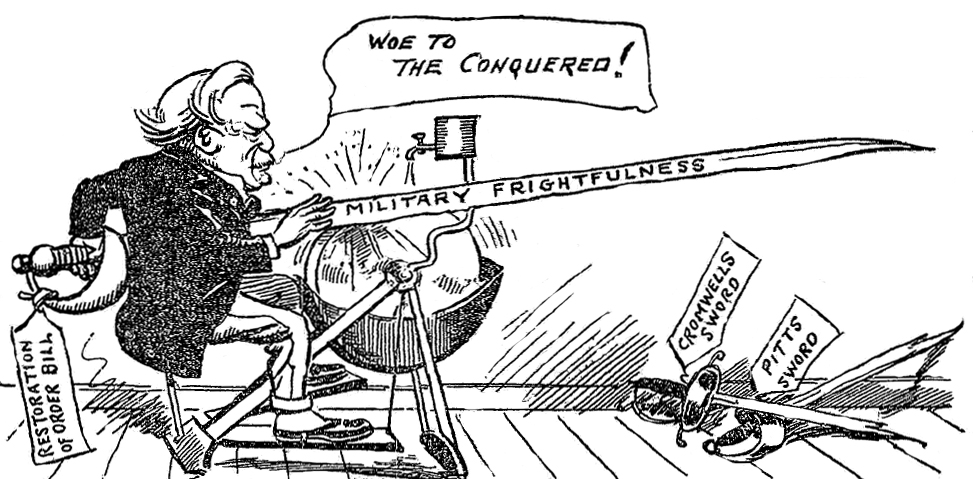Britain is ‘not at war with Ireland’ says Chief Secretary, despite new ‘Coercion Act’
London, 10 August 1920 - Royal Assent was given to the new Restoration of Order in Ireland Act yesterday.
Its passage wasn't without controversy, however. As the bill worked its way through a second reading in the House of Lords a voice was heard coming from the area allotted to the Privy Councillors complaining: ‘My Lords, if you pass this bill you may kill England, not Ireland.’ Despite this dissent, the legislation passed easily.
In an interview with a member of the Press Association before the bill passed, the Chief Secretary of Ireland, Sir Hamar Greenwood, attempted to allay Irish concerns about the legislation claiming that it would only apply where there is disorder. He said that in situations where civilian courts had failed owing to the intimidation of juries, the bill would ‘substitute a court which will administer the laws fairly and impartially’. Greenwood said that the British empire was ‘not at war with Ireland, but that certain extremists in that country have declared themselves at war with the British army.’

Hamar Greenwood, the Chief Secretary of Ireland (Image: © National Portraig Gallery, UK)
The Chief Secretary expressed confidence in the willingness of the catholic hierarchy under Cardinal Logue to face down extremism as they viewed with horror, he suggested, the murder of Irish policemen.
He believes the Catholic Church can be counted upon to do ‘its utmost to stop these outrages, which alienate the sympathy of the British public’ and make a settlement of Irish issues more difficult.
Despite the Chief Secretary’s emollient words about the bill’s intentions, its passage has deeply unsettled many nationalists. The Irish Parliamentary Party (IPP) MP for Belfast, Joseph Devlin was suspended from the House of Commons on 5 August for a display of what the Belfast Newsletter has called ‘mock heroics’.
Mr Devlin demanded the presence of the Prime Minister and the Leader of the House so that they could bear the responsibility for a bill that voted away the ‘liberties of Ireland.’ Devlin claimed that the Prime Minister had delivered a speech the previous day that had effectively declared war on Ireland. Devlin left the parliament accompanied by party colleagues: John Dillon, former MP for Mayo, who had been seated in the Distinguished Strangers’ Gallery; and T.P. O’Connor, MP for Liverpool. This led to speculation as to whether there will be a representative of Irish nationalism in the House of Commons again.
The Restoration of Order in Ireland Act has already been renamed the ‘Coercion Act’ in the Irish nationalist press. Observing the speed with which the Westminster parliament introduced the measures, the Freeman’s Journal has said the British had ‘given a fine example of their ability to legislate in haste; Ireland will see to it that they, like their predecessors in coercion, will be given ample opportunity to repent’.
[Editor's note: This is an article from Century Ireland, a fortnightly online newspaper, written from the perspective of a journalist 100 years ago, based on news reports of the time.]





















